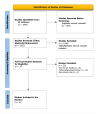Donanemab for Alzheimer's Disease: A Systematic Review of Clinical Trials
- PMID: 36611492
- PMCID: PMC9818878
- DOI: 10.3390/healthcare11010032
Donanemab for Alzheimer's Disease: A Systematic Review of Clinical Trials
Abstract
Amyloid-β (Aβ) plaques and aggregated tau are two core mechanisms that contribute to the clinical deterioration of Alzheimer’s disease (AD). Recently, targeted-Aβ plaque reduction immunotherapies have been explored for their efficacy and safety as AD treatment. This systematic review critically reviews the latest evidence of Donanemab, a humanized antibody that targets the reduction in Aβ plaques, in AD patients. Comprehensive systematic search was conducted across PubMed/MEDLINE, CINAHL Plus, Web of Science, Cochrane, and Scopus. This study adhered to PRISMA Statement 2020 guidelines. Adult patients with Alzheimer’s disease being intervened with Donanemab compared to placebo or standard of care in the clinical trial setting were included. A total of 396 patients across four studies received either Donanemab or a placebo (228 and 168 participants, respectively). The Aβ-plaque reduction was found to be dependent upon baseline levels, such that lower baseline levels had complete amyloid clearance (<24.1 Centiloids). There was a slowing of overall tau levels accumulation as well as relatively reduced functional and cognitive decline noted on the Integrated Alzheimer’s Disease Rating Scale by 32% in the Donanemab arm. The safety of Donanemab was established with key adverse events related to Amyloid-Related Imaging Abnormalities (ARIA), ranging between 26.1 and 30.5% across the trials. There is preliminary support for delayed cognitive and functional decline with Donanemab among patients with mild-to-moderate AD. It remains unclear whether Donenameb extends therapeutic benefits that can modify and improve the clinical status of AD patients. Further trials can explore the interplay between Aβ-plaque reduction and toxic tau levels to derive meaningful clinical benefits in AD patients suffering from cognitive impairment.
Keywords: Alzheimer’s disease; cognition; donanemab; elderly care; plaque.
Conflict of interest statement
The authors declare no conflict of interest.
Figures
Similar articles
-
Evidences and therapeutic advantages of donanemab in the treatment of early Alzheimer's disease.J Basic Clin Physiol Pharmacol. 2023 Dec 6;35(1-2):25-29. doi: 10.1515/jbcpp-2023-0176. eCollection 2024 Jan 1. J Basic Clin Physiol Pharmacol. 2023. PMID: 38053285 Review.
-
Donanemab in Early Alzheimer's Disease.N Engl J Med. 2021 May 6;384(18):1691-1704. doi: 10.1056/NEJMoa2100708. Epub 2021 Mar 13. N Engl J Med. 2021. PMID: 33720637 Clinical Trial.
-
Donanemab in Japanese Patients with Early Alzheimer's Disease: Subpopulation Analysis of the TRAILBLAZER-ALZ 2 Randomized Trial.Neurol Ther. 2024 Jun;13(3):677-695. doi: 10.1007/s40120-024-00604-x. Epub 2024 Apr 6. Neurol Ther. 2024. PMID: 38581616 Free PMC article.
-
Donanemab (LY3002813) Phase 1b Study in Alzheimer's Disease: Rapid and Sustained Reduction of Brain Amyloid Measured by Florbetapir F18 Imaging.J Prev Alzheimers Dis. 2021;8(4):414-424. doi: 10.14283/jpad.2021.56. J Prev Alzheimers Dis. 2021. PMID: 34585215 Clinical Trial.
-
Pharmacokinetic evaluation of donanemab for the treatment of Alzheimer's.Expert Opin Drug Metab Toxicol. 2024 Jun;20(6):411-417. doi: 10.1080/17425255.2024.2357637. Epub 2024 May 20. Expert Opin Drug Metab Toxicol. 2024. PMID: 38758223 Review.
Cited by
-
Mesenchymal Stem Cell (MSC)-Based Drug Delivery into the Brain across the Blood-Brain Barrier.Pharmaceutics. 2024 Feb 18;16(2):289. doi: 10.3390/pharmaceutics16020289. Pharmaceutics. 2024. PMID: 38399342 Free PMC article. Review.
-
Nanoscale flow cytometry-based quantification of blood-based extracellular vesicle biomarkers distinguishes MCI and Alzheimer's disease.Alzheimers Dement. 2024 Sep;20(9):6094-6106. doi: 10.1002/alz.14087. Epub 2024 Jul 3. Alzheimers Dement. 2024. PMID: 38958575 Free PMC article.
-
Digital Therapeutics for Improving Effectiveness of Pharmaceutical Drugs and Biological Products: Preclinical and Clinical Studies Supporting Development of Drug + Digital Combination Therapies for Chronic Diseases.J Clin Med. 2024 Jan 11;13(2):403. doi: 10.3390/jcm13020403. J Clin Med. 2024. PMID: 38256537 Free PMC article. Review.
-
A streamlined, resource-efficient immunoprecipitation-mass spectrometry method for quantifying plasma amyloid-β biomarkers in Alzheimer's disease.Res Sq [Preprint]. 2024 Sep 2:rs.3.rs-4947448. doi: 10.21203/rs.3.rs-4947448/v1. Res Sq. 2024. PMID: 39281858 Free PMC article. Preprint.
-
Drug Design for Alzheimer's Disease: Biologics vs. Small Molecules.Curr Alzheimer Res. 2024;20(12):821-826. doi: 10.2174/0115672050301583240307114452. Curr Alzheimer Res. 2024. PMID: 38468530 Review.
References
-
- Nandi A., Counts N., Chen S., Seligman B., Tortorice D., Vigo D., Bloom D.E. Global and regional projections of the economic burden of Alzheimer’s disease and related dementias from 2019 to 2050: A value of statistical life approach. EClinicalMedicine. 2022;51:101580. doi: 10.1016/j.eclinm.2022.101580. - DOI - PMC - PubMed
Grants and funding
LinkOut - more resources
Full Text Sources



